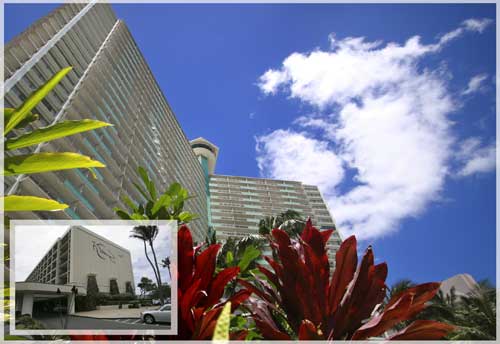Isle hotels in distress

The Ilikai and Turtle Bay Resort are two of the many Hawaii hotels in financial distress. Most of the troubled hotel owners borrowed money near the top of the market when prices were high and loans were readily available. The credit crisis and decline in real estate prices make it hard for hotels to refinance, and many end up in foreclosure.
Hawaii’s tourism industry is suffering from more than $2 billion in loan defaults at several major hotels, forcing some into foreclosure.
For hotel employees the financial troubles could mean less money for raises or improved benefits and – in the worst case – layoffs.
The financial distress makes it difficult for the hotels to get new loans.
" In the financial markets we’re sort of in a standstill in hotel lending right now. The chance of getting a new loan is very small since lenders have all these properties underwater," said David Carey, president and chief executive officer of Outrigger Enterprises Group. " It makes it very difficult for owners to spend more money on employees and benefit costs."
Most properties in distress were bought at the peak of the market four years ago with loans that were packaged and resold to investors as commercial mortgage-backed securities.
"Because money was free and easy, nobody spent a lot of time reviewing and making sure someone could pay it back," said Mike Hamasu, director of consulting and research at Colliers Monroe Friedlander Inc. "A lot of these people purchased short-term loans – five years at max – because they thought they were going to flip it in a couple years."
Don't miss out on what's happening!
Stay in touch with breaking news, as it happens, conveniently in your email inbox. It's FREE!
But the credit crisis virtually dried up lending, and that, along with the global economic downturn, put hotels in a difficult spot.
At least 10 Hawaii hotels have been in some stage of distress over the past year, with owners unable to pay their mortgages, refinance or sell in a down economy, according to a list compiled by Colliers. And more are expected to default as short-term interest-only mortgages expire within the next few years.
The operators of those hotels hope their financial troubles won’t keep customers away.
Consumers who don’t understand the financial process often are scared away when a property is named in foreclosure or identified as having financial trouble, said Bob Boyle, vice president and regional director of operations for Benchmark Hospitality International, which manages Turtle Bay Resort and Makena Beach & Golf Resort, two troubled properties.
"It (foreclosures or lender takeovers) is so commonplace now that it has become acceptable as a regular part of financing hotels," said Boyle.
It doesn’t mean the hotel service is diminished, he said.
"When they see the words ‘foreclosure,’ they start to think of boarded-up windows and chained-up doors," he said, adding that his phone has rung off the hook for months from panicked mothers of brides whose weddings were planned at Turtle Bay.
The deed to the Turtle Bay Resort was transferred in April to a consortium of lenders in lieu of foreclosure after Oaktree Capital Management LP defaulted on mortgage debt totaling $400 million. "People tend to shy away if there’s a financial cloud over the property, and that becomes a self-fulfilling prophesy."
In the case of the Makena Resort, which was foreclosed and auctioned last month after Maui developer Everett Dowling and Morgan Stanley defaulted on a $192.5 million mortgage loan, more than 100 employees were laid off during the foreclosure process last September. Eighty-five workers have since been rehired.
In addition to the difficulty hotel owners are having with finding new loans, they have been squeezed in recent years by lower room rates and lower occupancy.
Statewide hotel occupancy for the first four months of year rose 5.6 percent over the previous year to 69.4 percent, according to Hospitality Advisors LLC. But that pales in comparison with the same period in 2006, when occupancy hit 81.6 percent.
Meanwhile, average hotel room rates have plunged as much as 25 percent from the 2006 peak, which means lower profits for hoteliers, according to Carey.
Revenue per available room – the industry’s key measure of profitability – plunged nearly 20 percent year to date to $121.65 from $151.38 in the 2006 period.
"In order to generate any business at all in this sort of tougher economy, pretty much everybody’s trashed their prices," Carey said. "So owners are experiencing a significant profit squeeze."
That makes it nearly impossible to refinance loans, which means distressed hotels may have to be sold at dramatically lower prices, he added.
While the industry is struggling to correct itself as a result of hotel owners who overpaid and overborrowed, "it’s painful but necessary," according to Honolulu tourism consultant Joseph Toy.
"We have to go through the cycle," he said. "Even though it sounds bad, it’s a good thing because we have to have the whole recapitalization occur in order for our industry to get on the right footing."
Similar to the Japanese boom and bust of the 1990s, hotels had to go through the down cycle of distressed properties that were sold to new owners at lower prices, which were more manageable and allowed properties to move forward, he said.
"What it does is it rejuvenates the properties – when you have new capital coming in, it typically gives new security to employees and the industry because we’re on firmer ground," Toy said. "It alleviates the financial pressures around these hotels."
Once the properties are sold, it "gets you out from under that cloud and gives you new life," Boyle added.



